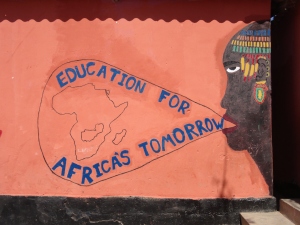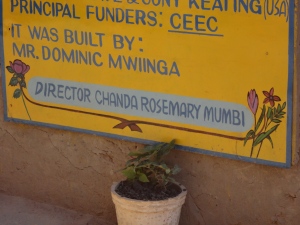Rosemary Mumbi’s unwavering faith is what has helped her overcome the many obstacles she has faced in both her career and personal life. The 70 year old headmistress of Hope and Faith school in Lusaka’s Ngombe community has come a long way from her beginnings as a village girl. After studying Education Management at Bristol University and being appointed headmistress at five different secondary schools, she found her name in the history books as the first female provincial officer for the Copperbelt. Despite over 32 years teaching experience, Rosemary admits that she didn’t plan to be in this role at this stage in her life.
“Looking at the position I was in when I decided to start a school, any sensible person would have thought it impossible,” says Rose, “I was over 60, a widow and broke. There were a lot of challenges in that first year, particularly the financial constraints, and it definitely felt as though the odds were against me.“
It was a traumatic event which changed the course of Rosemary’s life and has led to her settling in Lusaka. Rose and her husband Max Mumbi, married in Lusaka in 1968, bought a farm in the Copper Belt province which they hoped to transform into a nature reserve. Tragically, Max died a year later, leaving Rose responsible for the farm and land. With no man in the house, the farm became the target of thieves.

“The farm was attacked on numerous occasions but on the tenth occasion, the thieves stole everything that me and my husband had worked over thirty years to build up. Myself and my 16 year old son hid in the pantry while they smashed a hole through the house wall and emptied the house. They took everything from the baths and sinks to family photos and books for which they would surely have no use. I was left with nothing. We prayed for the twenty two hours that they raided the house, and thankfully were spared.”
Despite this horrific experience, Rose’s strong faith in God helped her to see the light where many couldn’t.“When I saw the house empty, it was a huge shock. I remember my son turning to me and saying ‘Maybe you didn’t need all that stuff now. Maybe this is God’s way of showing you that it’s time for a new start’.”
With this in mind, she sought a new life in Lusaka where Hope and Faith found it’s humble beginnings as a nursery in a single room with just two pupils. A generous donation from a former colleague helped Rose get back on her feet and the school gradually grew, with children aged 3-6 coming from the surrounding area. Ten years on, the school is now attended by 716 pupils.

“It can be challenging at times with all the different age groups so to keep things organised, we separate the school into three departments – pre-school, primary and secondary. Like the UK, we follow the National Curriculum.”
Despite the vast collection of books, tidy classrooms and smart uniforms, Hope and Faith doesn’t just cater to those who can afford an education. 175 of the pupils are orphans, many of whom live at the nearby orphanage called God at Work. One of these former ‘street kids’ is Mike Mwanza, who lost both parents to HIV. When his relatives couldn’t afford to look after him, he was left with no fixed abode and turned to alcohol at the age of 9. After attending Hope and Faith as a youngster, he now preaches at the school which helped him turn his life around. But his is just one success story in what is a much wider problem.
Reflecting on this, Rose said “Although there are places like Hope and Faith, there are still a lot of street children who are unable to attend school. I didn’t realise the extent of the problem until I moved to Lusaka. HIV and Aids awareness has definitely improved over the past ten years, but the majority of orphans here are still a result of the AIDs crisis.”
A major part of the IDEALS project is increasing HIV/Aids awareness amongst youngsters, and Rosemary acknowledges that sport is a useful way of educating children. “Sport is good in more ways than you can think. In the first sense, there are children who are very talented and can make a living from it. It also enables the children to learn about other schools and communities through tournaments, like IDEALS Wallace Tournament. As well as learning about the outer world and other cultures, having IDEALS students here provides a distraction for the students and takes their mind off the social problems some of them may face at home. I believe in sport and encourage it.”
Although projects like IDEALS can help towards development in Lusaka, Rose stresses that Zambian people need to take responsibility for their own learning. “I tell the children every day, don’t blame God or the government for how your life turns out. You have a responsibility to your nation and yourself. For Lusaka to develop, we need to re-educate society, to create future employers rather than employees. Education is the biggest pathway to development.”

It is this faith in education that has enabled Rose to achieve so much in the first ten years of Hope and Faith school. But how can the school continue to grow and develop? “By God’s grace, I would like to see a college attached to the school that caters to vulnerable children and orphans who couldn’t otherwise afford college education.”
And, if a little hope and faith have gotten her this far, I don’t doubt that Rosemary Mumbi will achieve this and more. When I asked whether she had ever considered leaving Zambia and joining her daughters in the UK or son in Melbourne, the answer couldn’t be more clear. “I’ll always stay in Zambia. I love my home, love my country”. And it’s clear that, more than ever, Zambia needs people like her.

